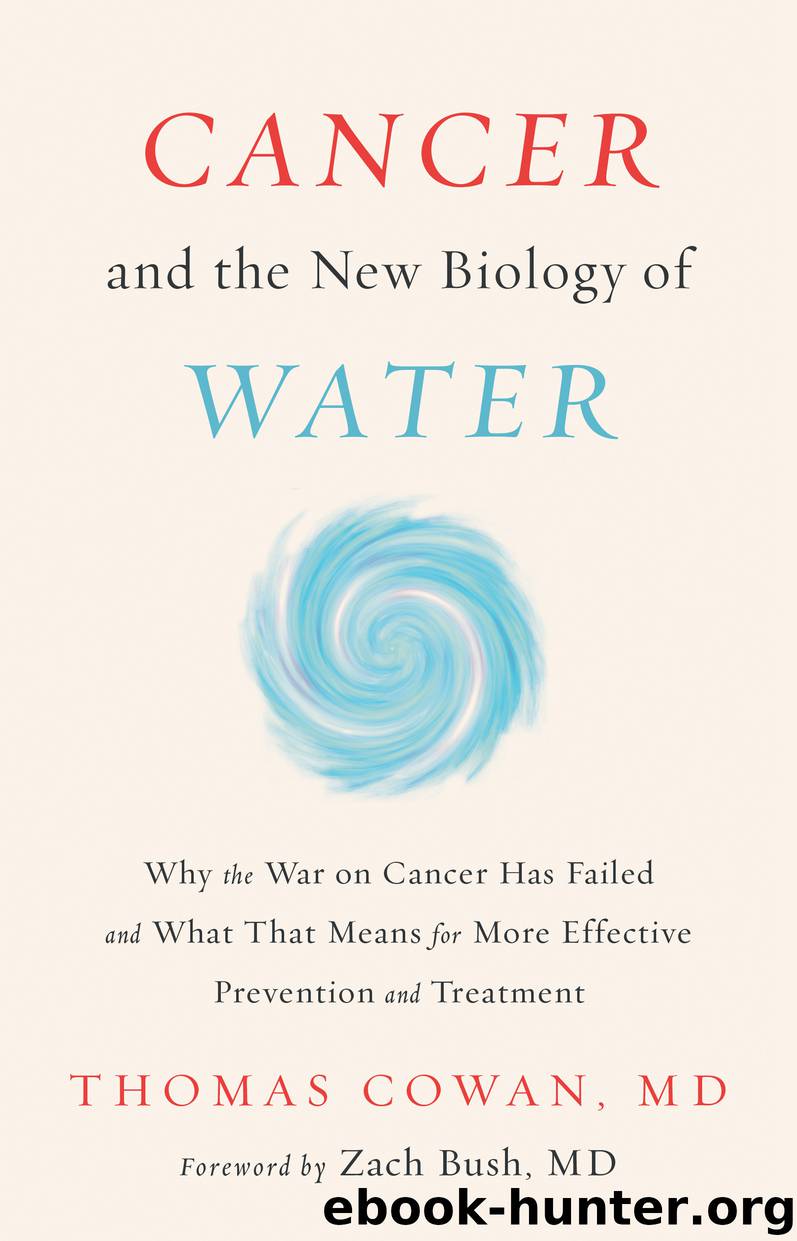Cancer and the New Biology of Water by Thomas Cowan

Author:Thomas Cowan
Language: eng
Format: epub
Publisher: Chelsea Green Publishing
CHAPTER EIGHT
The Ketogenic Diet
A few months ago I was listening to an episode of the Joe Rogan Show about whether a vegan diet or Paleo diet is better for preventing or managing heart disease. I happened to know both of the guests, each a respected leader in his field of expertise. The vegan cardiologist gave an eloquent explanation about how there was virtually no heart disease in this country during the early part of the twentieth century. Then things began to change around the Second World War, until heart disease escalated to near epidemic proportions. In my opinion, the debate should have ended at that point with a simple question: “As you pointed out, there was virtually no heart disease in the early part of the twentieth century. How many people ate a vegan diet at that time?” The answer, of course is zero. How can anyone claim that by eliminating those foods such as cream, butter, and eggs that were considered “health foods” at a time when people had no heart disease, we would somehow eliminate heart disease? It defies logic.
Something similar has happened with the diet and cancer connection. Cancer was rare in the early twentieth century. Family doctors went their whole careers without seeing a single case of breast cancer. Today most people know someone in their immediate neighborhood, if not their own family, with breast cancer, a disease now affecting people at younger and younger ages. All this has occurred during the past fifty years or so, since a vegetarian or vegan diet became the accepted holistic cancer diet. Never mind that people rarely got cancer when almost no one ate a vegan or vegetarian diet. Furthermore, numerous anthropology studies and books have confirmed the absence of cancer in indigenous people even though none ate a vegetarian or vegan diet.1 The tide has started to turn recently and people seem much more open to exploring different diets for cancer, especially since the publication of Dr. Thomas Seyfried’s Cancer as a Metabolic Disease.
As we saw in chapter 2, Seyfried posited that the fundamental defect in cancer is dysfunction of the mitochondria. The mitochondria are essentially primitive bacteria, complete with their own genome, that reside in the cytoplasm of most mammalian cells. The role of the mitochondria is to produce ATP, the so-called energy molecule of the body. In return for being their internal power plants, the cells supply the mitochondria with nutrients, antioxidants in particular, which allow the mitochondria to function smoothly and efficiently.
The Warburg effect, also discussed in chapter 2, is that all cancer cells have defects in their mitochondrial function that prevent these mitochondria from producing the energy needed for optimal cellular function. These defects can be genetic in nature, or from radiation, coal tar, and an endless list of other carcinogens. As a result, the cells shift to the glycolytic pathway and start to produce energy through glycolysis, otherwise known as fermentation. This is a primitive, inefficient way to produce ATP, one used by single-celled organisms and fungi.
Download
This site does not store any files on its server. We only index and link to content provided by other sites. Please contact the content providers to delete copyright contents if any and email us, we'll remove relevant links or contents immediately.
Periodization Training for Sports by Tudor Bompa(8272)
Why We Sleep: Unlocking the Power of Sleep and Dreams by Matthew Walker(6725)
Paper Towns by Green John(5191)
The Immortal Life of Henrietta Lacks by Rebecca Skloot(4588)
The Sports Rules Book by Human Kinetics(4386)
Dynamic Alignment Through Imagery by Eric Franklin(4217)
ACSM's Complete Guide to Fitness & Health by ACSM(4060)
Kaplan MCAT Organic Chemistry Review: Created for MCAT 2015 (Kaplan Test Prep) by Kaplan(4012)
Livewired by David Eagleman(3774)
Introduction to Kinesiology by Shirl J. Hoffman(3770)
The Death of the Heart by Elizabeth Bowen(3622)
The River of Consciousness by Oliver Sacks(3604)
Alchemy and Alchemists by C. J. S. Thompson(3522)
Bad Pharma by Ben Goldacre(3428)
Descartes' Error by Antonio Damasio(3279)
The Emperor of All Maladies: A Biography of Cancer by Siddhartha Mukherjee(3163)
The Gene: An Intimate History by Siddhartha Mukherjee(3098)
The Fate of Rome: Climate, Disease, and the End of an Empire (The Princeton History of the Ancient World) by Kyle Harper(3067)
Kaplan MCAT Behavioral Sciences Review: Created for MCAT 2015 (Kaplan Test Prep) by Kaplan(2986)
